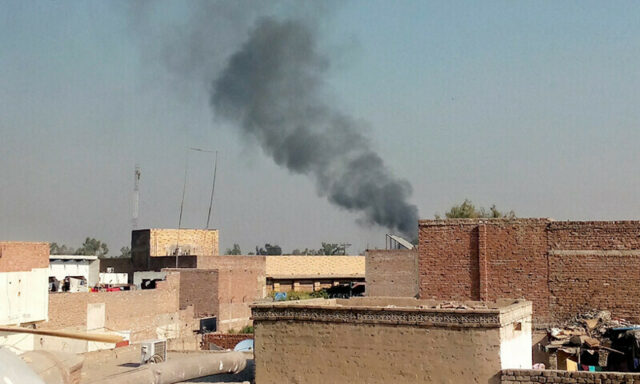
Implications of TTP Attack on Counter Terrorism Department Compound in Bannu
Publication: Terrorism Monitor Volume: 21 Issue: 2
By:

Introduction
Since the fall of Kabul to the Taliban in August 2021, Tehrik-i-Taliban Pakistan (TTP) attacks have accelerated in Pakistan. After attacks in remote territories, the TTP has also now broadened its operations to include mainstream areas. The December 18, 2022 TTP attack on a Counter Terrorism Department (CTD) compound in Bannu Cantonment, for example, was a case that particularly alarmed the Pakistani government. It took the security forces two days to clear the compound in Bannu, leading to the deaths of three members of the security forces and 25 militants (The Express Tribune, December 20, 2022).
The Road to the Bannu Cantonment Attack
TTP insurgents attacked the CTD compound in Bannu because dozens of TTP members were in CTD custody; reportedly, TTP militants overpowered security guards and snatched their weapons. They freed not only their inmates, but also held several security officials in the building and demanded the government provide a safe path to Afghanistan (Pakistan Today, December 19, 2022). After two days of the Pakistani government refusing to negotiate, Pakistan’s Special Services Group (SSG) commandos launched an operation and killed all the militants. However, the incident raised concerns in the Pakistani security apparatus. The attack was so severe that it prompted the U.S. State Department spokesperson to offer assistance to Pakistan and declare that counter-terrorism was a shared goal between the two countries (The Express Tribune, December 20, 2022).
The TTP attack on the CTD compound, however, was not an isolated attack that unfolded in a few days. There was a lengthy background and trail of events that preceded it, including the following:
First, the TTP relationship with the Afghan Taliban has provided the former with strength and sanctuary in Afghanistan (Terrorism Monitor, July 1, 2022). The lack of Pakistani government control in the tribal areas, especially in North and South Waziristan, provides the TTP with an expansive space to organize and launch operations. Before the fall of Kabul, the Afghan government was not taking any action against TTP due to its fractious relations with Pakistan. Now, with the Taliban in charge and maintaining a close bond with TTP, Pakistan has additional challenges in curbing the TTP’s strength (Dawn, October 8, 2022).
Secondly, the fall of Kabul was a momentous event not only for the Afghan Taliban but also for TTP, which was emboldened by the capture of the Afghan capital. As a result, the TTP has begun to believe that it, too, can take over Pakistan or at least some part of the country, such as Bannu in southern Khyber Pakhtunkhwa, to establish rule by sharia (Terrorism Monitor, November 4, 2022).
Thirdly, the TTP-Pakistan backdoor negotiations facilitated by the Afghan Taliban provided some relief to TTP by allowing the group to operate in Swat with government permission, although this caused outrage among civilians in the area (Terrorism Monitor, November 4, 2022). The Pakistani government’s over-emphasis on negotiations also provided the TTP a sense of confidence. This has encouraged the TTP to make more stringent demands of the government, such as reversing the tribal areas merger with Khyber Pakhtunkhwa and freeing its prisoners (The Express Tribune, June 20, 2022). Further, the long duration of the negotiations provided TTP a chance to organize its activities beyond the tribal areas (Dawn, December 8, 2022). And, ironically, even after the negotiations with the TTP failed, the government did not take any retributive actions against the TTP.
Fourthly, the U.S. withdrawal from Afghanistan had a significant impact on the TTP’s activities. When U.S. troops were in Afghanistan, the Afghan Taliban were preoccupied by the U.S. forces, and the TTP could not obtain the needed backing from the Afghan Taliban. Further, it took effort for the TTP to reorganize and protects its forces in Afghanistan freely amidst pressure from U.S. forces. The U.S. withdrawal provided more breathing room to the TTP, which led to the group’s expansion across Khyber Pakhtunkhwa (Dawn, December 4, 2022).
Conclusion
The deteriorating security situation in Pakistan due to TTP attacks is causing severe problems for Islamabad. Within a week of the Bannu attack, a suicide bomber exploded a car in the capital, killing a policeman and injuring several civilians (Dawn, December 23, 2022). The TTP’s attack in Islamabad shows that it can conduct attacks virtually anywhere in the country. Meanwhile, negotiations with the TTP are faltering, while the need for a comprehensive strategy to tackle the insurgent group lingers. The Pakistani parliament is increasingly asking for military action against the TTP; at the same time the Pakistani government must also work to convince the Taliban in Afghanistan to finally take decisive action against the TTP and prevent the group from using Afghan soil as a safe haven (VOA Deewa, December 25, 2022).
Unexpected events occurred following the U.S. withdrawal from Afghanistan that negatively impacted Pakistan security. Pakistan had expected the Taliban to limit TTP activities in Afghanistan and abide by the promise to not allow Afghan soil to be used by anyone against any state. However, the situation was turned upside down following the fall of Kabul, and even the Taliban did not recognize the extent to which the TTP would depend on using bases in Afghanistan for operational planning (Dawn, December 24, 2022). In such a situation, Islamabad will need to revisit its Afghanistan-related security policies vis-à-vis the Taliban and TTP.



